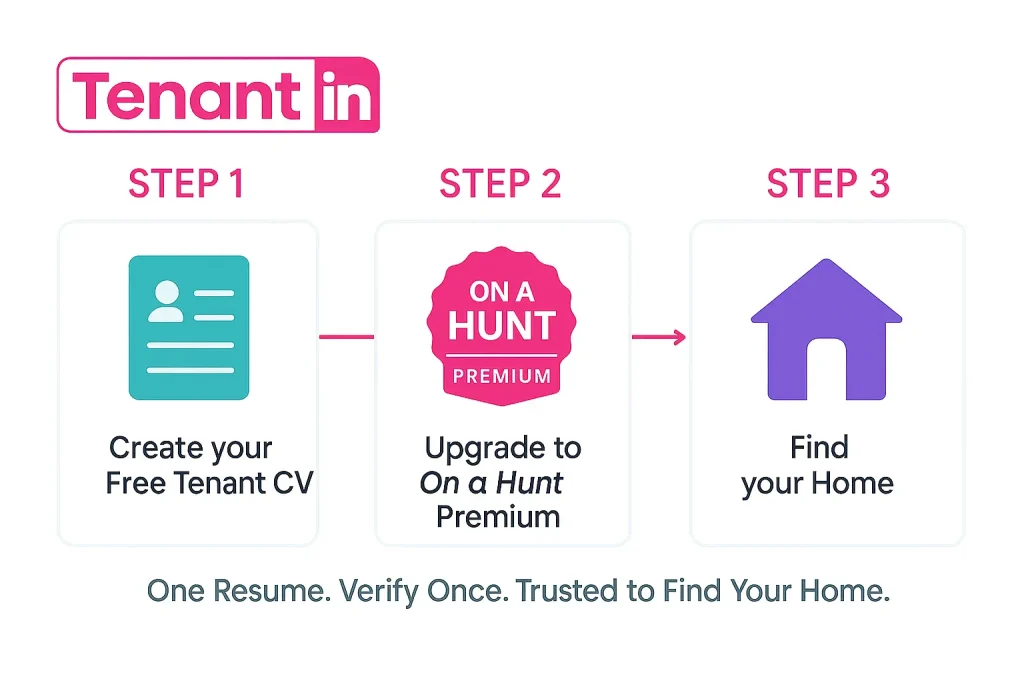Finding the right tenant can make or break a rental experience. A well-prepared tenant CV, also known as a tenant resume, is the first impression a landlord gets—and it often decides whether an application is even considered.
In Ireland’s competitive rental market, time is short and decisions are quick. For landlords, learning how to read and evaluate a tenant resume properly can save headaches down the line. For tenants, understanding what landlords look for can help you build a stronger application and get noticed.
In this article, we’ll explore what makes a tenant CV stand out, what to look for in a prospective tenant, and how to assess details like rental history, employment, and more.
Why the Tenant CV Matters When Renting in Ireland
Gone are the days when a quick phone call or short email was enough to secure a viewing. Now, especially when renting in Ireland, most landlords expect a clear, structured profile that provides evidence of reliability and readiness to rent.
A tenant resume helps landlords:
- Quickly understand the applicant’s background
- Evaluate financial stability
- See rental history at a glance
- Identify red flags or inconsistencies early on
For tenants, having a well-organised CV shows professionalism and sets the tone for a responsible tenancy.
Platforms like Tenantin.ie offer a free tool for tenants to create and download a complete tenant resume. It ensures that all critical information is clearly presented and ready to send at a moment’s notice.
What Landlords Should Expect in a Good Tenant Resume
A complete tenant resume should give you, the landlord, everything you need to make an informed first impression. Here’s what to look for:
1. Clear Personal Information
Start with the basics. The tenant should include:
- Full name
- Current address (even if temporary)
- Contact information
- Age (optional, but common)
- ID verification (passport or driving licence, when requested)
This helps confirm the applicant is real and reachable, and it shows that they’ve taken the time to provide full details.
2. Detailed Rental History
One of the most important parts of a tenant resume is the rental history. This gives insight into how reliable a tenant has been in previous homes.
Look for:
- Previous addresses
- Length of time at each property
- Reason for leaving
- Landlord or agent references
- History of on-time rent payments (if mentioned)
A clean, consistent rental history can indicate reliability and long-term potential. Gaps or very short stays may warrant further questions, but aren’t necessarily deal-breakers.
3. Stable Employment or Proof of Income
Reliable income is a key factor in choosing the right tenant. Whether the person is employed, self-employed, or receiving regular financial support, it should be clearly outlined in the resume.
Expect to see:
- Employer name and role
- Length of employment
- Salary (optional but helpful)
- Employment contract or offer letter
- Self-employed income statements or proof of savings
Even students or jobseekers should include some form of financial backing, such as a guarantor or scholarship documentation. This gives peace of mind that rent will be paid consistently.
4. Character References
A strong resume often includes references from previous landlords, employers, or even flatmates. These can vouch for the applicant’s cleanliness, communication style, and trustworthiness.
Look for:
- Contact details of the referee
- Context of the relationship
- Summary of the recommendation
Even a short note from a past landlord stating “rent was always on time, left the flat in good condition” can be very reassuring.
5. Cover Note or Personal Introduction
Though not essential, a short paragraph or message explaining who the tenant is and why they’re moving can be a helpful addition. It gives context and shows thoughtfulness.
For example:
“I’m moving to Dublin from Cork for a new role in a tech company. I’ve been renting for five years with no missed payments and am looking for a long-term lease. I’m quiet, tidy, and respectful of shared spaces.”
This human touch can make a big difference in a crowded inbox.
Red Flags Landlords Should Watch Out For

While most tenant resumes will be honest and clear, there are a few things worth double-checking or clarifying:
- Missing rental history: If it’s not mentioned at all, ask why.
- No references: This could be due to inexperience or issues with a former landlord.
- Inconsistent employment information: Gaps in job history or unclear income sources may need clarification.
- Unexplained urgency: Phrases like “need to move immediately” could be fine—but combined with other red flags, they may suggest instability.
Of course, everyone deserves a fair chance. If you see gaps, the best approach is to ask respectful questions. Many new renters in Ireland are expats or students without local references, and they often make excellent tenants with the right support.
How Tenants Can Strengthen Their CV
If you’re a renter, especially one new to Ireland, it’s essential to show landlords that you’re serious and prepared.
Here’s how to stand out:
- Use a free resume tool like Tenantin.ie to build a complete profile
- Be honest about your situation, but proactive in addressing gaps
- Offer alternative forms of trust, like upfront rent payments or guarantor support
- Keep your information up to date and ready to send quickly
Premium services like “On a Hunt” also help renters by sending automatic enquiries, boosting their profile to landlords, and assigning support from the Tenantin team.
The Role of Technology in Rental Applications
Digital tools are transforming the rental process. For landlords, using platforms where resumes are already formatted, verified, and easy to read can streamline decisions. For tenants, services like Tenantin.ie reduce the stress of finding listings and make it easier to present a strong application.
As a landlord, reviewing tenant profiles through verified platforms helps:
- Save time screening emails
- Receive consistent documentation
- Feel more confident in your decisions
As a tenant, knowing what landlords want in a CV makes it easier to tailor your application and increase your chances of success.
Final Thoughts
The tenant resume is quickly becoming a standard part of renting in Ireland. For landlords, understanding what to look for—from rental history to income and references—can prevent problems before they begin. For tenants, having a complete and clear CV can mean the difference between getting a reply or being overlooked.
By using platforms like Tenantin.ie, renters can create a polished profile using a free tool, while landlords gain access to better-organised applications.
In a market that moves fast, preparation is everything. Whether you’re letting or renting, a strong tenant CV brings clarity, trust, and better outcomes for everyone involved.
Frequently Asked Questions
What is a Tenant CV?
A Tenant CV is a document that provides landlords with essential information about a prospective tenant. It typically includes personal details, rental history, employment information, and references. This helps landlords assess whether the tenant might be a good fit for their property.
Why is employment history important in a Tenant CV?
Employment history is crucial as it indicates the tenant’s ability to maintain consistent income and pay rent on time. Landlords prefer tenants with stable jobs because it reduces the risk of missed payments.
How does rental history benefit my application?
A comprehensive rental history shows your experience as a tenant. It allows landlords to see if you have been reliable in paying rent and maintaining properties in good condition. Positive references from previous landlords can significantly strengthen your application.
What kind of references should be included?
Include both personal and professional references. Personal references can vouch for your character, while professional or landlord references can attest to your reliability and responsibility as a tenant.
Should I include my credit score in my Tenant CV?
While not mandatory, including your credit score can be beneficial as it demonstrates financial responsibility and reliability. However, always ensure you have permission to share this information.
How detailed should my personal information be?
Be concise yet informative with personal details like your full name, contact information, and current living situation. Avoid oversharing sensitive personal data beyond what is necessary for rental considerations.
How can I demonstrate financial stability without a long employment history?
If you’re new to the workforce or self-employed, consider providing bank statements that show regular income or savings sufficient to cover rent for several months. This can reassure landlords of your financial stability.
What are landlords cautious about when reviewing a Tenant CV?
Landlords often look out for gaps in rental history, frequent changes in employment, or poor references. Address these issues directly if they appear in your CV to provide context and reassurance.
Is it helpful to customize my Tenant CV for different properties?
Yes, customizing your Tenant CV for specific properties can highlight relevant aspects of your profile that align with the landlord’s preferences or property features, such as pet-friendliness if you own pets.
Where can I find more resources to improve my Tenant CV?
Websites like tenantin.ie offer valuable resources and insights on creating an effective Tenant CV and navigating the rental market successfully.
By preparing a thoughtful and detailed Tenant CV, tenants can present themselves positively to potential landlords and increase their chances of securing their desired rental property.







